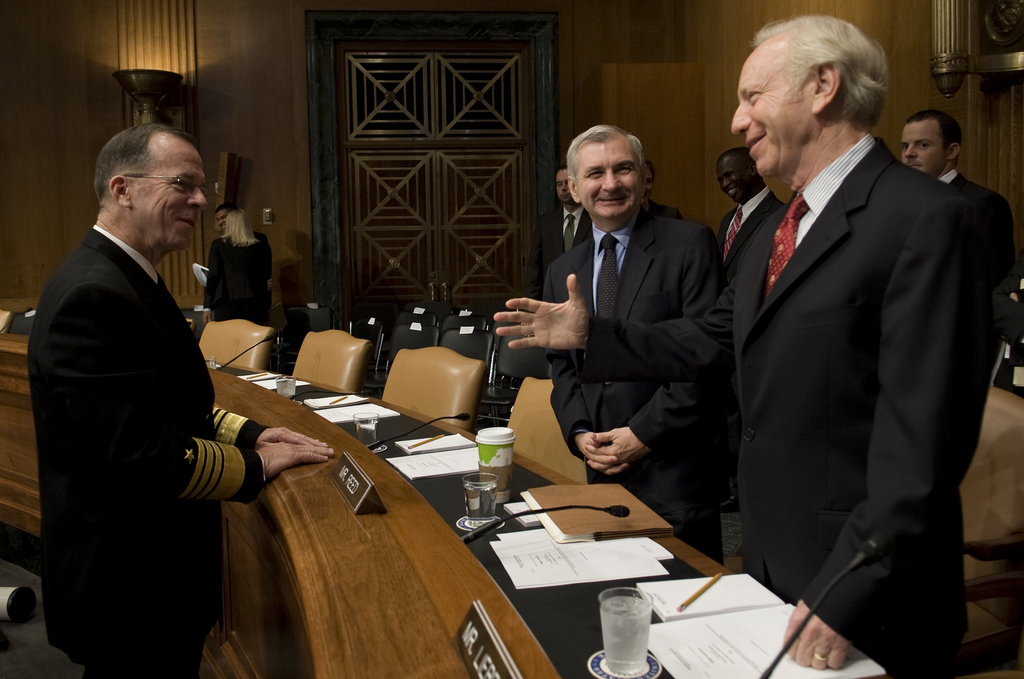(Introducing The “Misery Club”)
It was 3 April 2002. A group of Project For The New American Century neocons were penning off a letter to President George Bush regarding aggressive American intervention in the Middle East. Among the signees were Bill Kristol, Eliot Cohen, Frank Gaffney, Bruce Jackson, Donald Kagan, Robert Kagan, Richard Perle, Norman Podhertz, Randy Scheunemann and James Woolsey. Some of these names may be familiar to you, but some like Scheunemann may not be on your radar. Well Mr. Scheunemann was a lobbyist for the country of Georgia, a mini player on the world scene that was nose to nose with the Russians in a nasty military dustup. Randy was also foreign policy advisor for John McCain and, for a brief time, Sarah Palin.
Here are a few high points from that infamous presidential correspondence:
“No one should doubt that the United States and Israel share a common enemy.”
“The United States should lend its full support to Israel as it seeks to root out the terrorist network that daily threatens the lives of Israeli citizens.”
“Mr. President, we urge you accelerate plans for removing Saddam Hussein from power in Iraq. As you have said, every day that Saddam Hussein remains in power brings closer the day when terrorists will have not just airplanes with which to attack us, but chemical, biological, or nuclear weapons as well.”
Among the biggest agitators for war with Iraq was the neocon group listed above. With a 10-year war anniversary on the books, let’s look at how things have played out for America, what we have learned, and how we should prepare for the future based on that knowledge. For the record, I was against the Iraq war from the outset. America’s foremost foreign policy team, the Cato Institute group led by Chris Preble, was also no fan of the Iraq war.
In a nationally televised address, President George Bush told the American people that we went to war “to disarm Iraq, to free its people, and to defend the world from grave danger.” In an anniversary update , Cato V.P Gene Healy writes, “Ten years later, the future of ‘Iraqi Freedom’ is unclear at best, but it’s evident that there wasn’t much to disarm and the world was never in grave danger.”
Mr. Healy documents that in 2002, prior to the kick off of Operation Iraqi Freedom, all members of the Senate had at their disposal the 92-page National Intelligence Estimate on the Iraq threat. Would it not have been reasonable to assume that John Kerry, current secretary of state, and Hillary Clinton, former secretary of state, would have gone through the document with a fine-tooth comb? But no, neither, as Mr. Healy notes, took the time. Mr. Healy reports that exactly six senators read the report and that Jay Rockefeller (D-WV) said that the document made for “extremely dense reading.” Kerry, Clinton, Rockefeller—these are the people Americans want making decisions for the country?
So what does the Operation Iraqi Freedom report card look like? Gene writes, “A new report from the Watson Institute for International Studies at Brown University tallies up the costs: nearly 4,500 U.S. troop fatalities, an eventual budgetary cost of some $3.9 trillion, and more than 130,000 civilians as ‘collateral damage’.” The Brown report also talks of nearly $500 billion in unpaid benefits to U.S. veterans of the Iraq war that could balloon to over $6 trillion over the next 40 years.
Pat Buchanan writes, “Gen. Bill Odom, former director of the National Security Agency, thought George W. Bush & Co. had lost their minds: The Iraq War may turn out to be the greatest strategic disaster in American history…. Of the three goals of the war, none was achieved. No weapon of mass destruction was found. While Saddam and his sons paid for their sins, they had nothing at all to do with 9/11. Nothing.”
Bill Kristol, Frank Gaffney, Robert Kagan, Randy Scheunemann and the neocon trumpeters have been proven wrong, yet the group, with a regular Fox News platform, is at it again this time beating the Iran war drums. The Defending Defense Project has been cobbled together to provide academic support. As Pat Buchanan notes, ‘What makes the question more than academic is that the tub thumpers for war on Iraq a decade ago are now clamoring for war on Iran. Goal: Strip Iran of weapons of mass destruction? All 16 U.S. intelligence agencies say Iran does not have and has no program to build.”
 Enter Cato Institute’s Chris Preble, author of The Power Problem: How American Military Dominance Makes Us Less Safe, Less Prosperous, and Less Free.
Enter Cato Institute’s Chris Preble, author of The Power Problem: How American Military Dominance Makes Us Less Safe, Less Prosperous, and Less Free.
With the historical Iraq table now set, where can you go from here to be part of a nationwide effort to alter the course of American foreign policy? The goal is to prevent the sort of national disgrace associated with the debacles in Korea, Vietnam, Iraq and Afghanistan (next Monday’s featured post). First you need to know who to rely on and who has historically proven to be untrustworthy as to the direction of America’s foreign policy initiative. Above is my checklist of the untrustworthy, a group I label as the “Misery Club.” And as a quick add on, I do not want to neglect the inclusion of Sen. John McCain, (R-AZ), who has recently referred to Sen. Rand Paul (R-KY) as a “wacko bird.” For my money, Rand Paul ranks #1 in the Senate. I will be expanding on the “Misery Club” next Monday. At the far other end of the spectrum, standing in solid opposition to the “Misery Club,” is the Cato Institute’s foreign policy team, led by Chris Preble.
In The Power Problem, Chris lays out a detailed tally of the rights and wrongs in American foreign policy. I have been through this great book twice, including a detailed look at Chris’s 34 pages of notes. Regarding the safety of America and your family, this is the book you want to read first. I’ve about wrecked my hard copy with volumes of notes, scribbling in the margin, and underlining. Thus I have a second copy of The Power Problem on my iPad. As I have previously written, The Power Problem becomes more and more timely by the week as the errors of American policy, championed by the “Misery Club,” compound.
I have selected a top 10 outline for you from The Power Problem. My outline will give you a down and dirty check list for quick reference when you find yourself bombarded by neocon yak (Fox TV) from the “Misery Club.”
(1) The total amount that we spend on our military every year in the United States is roughly the same as the sum total of all defense expenditures by every other country on the planet.
(2) Even aircraft and ships designed in the 1980’s and built in the 1990’s are superior to what other countries can put in the air or out to sea today.
(3) Powell (Colin) was incensed by the implications that U.S. soldiers were geopolitical pawns that policymakers in Washington could move around some “global game board.”
(4) Often times, however, foreign interventions are not intended to advance U.S. interests; the interventions are, as their advocates suggest, ”gifts” intended for others. But because our government’s enumerated powers do not include the right to give such gifts—paid for by U.S. tax payers—Washington often attempts to justify such gifts on the grounds that U.S interests are at stake, even when they are not. The intervention in Bosnia and Kosovo in 1995 and even 1999 respectively, reflect this approach, as did calls for U.S. military intervention in Liberia in 2003, or in Sudan in 2006, or the absurd notion that these were crucial fronts in the “war on terror.”
(5) Even short relatively small-scale operations can prove extremely costly for those involved…. The mission in1992-93 in Somalia collapsed after a firefight in Mogadishu that left eighteen Army Rangers dead.
(6) It is essential that every weapon system, every proposal to increase size of the force, every plan for deploying our military abroad or for expanding operations already under way, be scrutinized anew.
(7) We need a new approach to military intervention grounded in a realization that even well-managed wars unleash a host of unintended consequences.
(8) What do we really need in terms of military capacity? I contend that we need enough to ensure our peace and security. We must be able to deter any state foolish enough to threaten the American homeland.
(9) If our physical security, our homeland, were under assault, if foreign armies set foot on U.S. soil for the first time since 1815, we can rest assured that every American capable of carrying a gun (and we have 200 million of them!) would make the foolish aggressor pay.
(10) As for the threat posed by terrorist groups and other non-state actors, 280 modern warships, 8,000 military aircraft, 30,000 tanks and armored personnel carriers, and more than 1.4 million men and women at arms did not deter nineteen angry young men (none from Iraq) from flying airplanes into buildings on 9/11; twice or three times that number of ships, planes and tanks would have been equally irrelevant.
Attach my 10-point Chris Preble outline to the five-point Weinberger/Powell Doctrine I wrote about last week and you have a straight-on template for American foreign policy. At the least, you will be able to follow along with the Cato Institute, Chris Preble, and Dick Young. And you will have a checklist of talking points when friends and associates mistakenly choose to promote you on the discredited thinking of the “Misery Club.”
Warm regards,
Dick
P.S. See Black Hawk Down. I was shocked by some of the things I learned from a Black Hawk technical advisor to the movie.
If you’re willing to fight for Main Street America, click here to sign up for my free weekly email.




